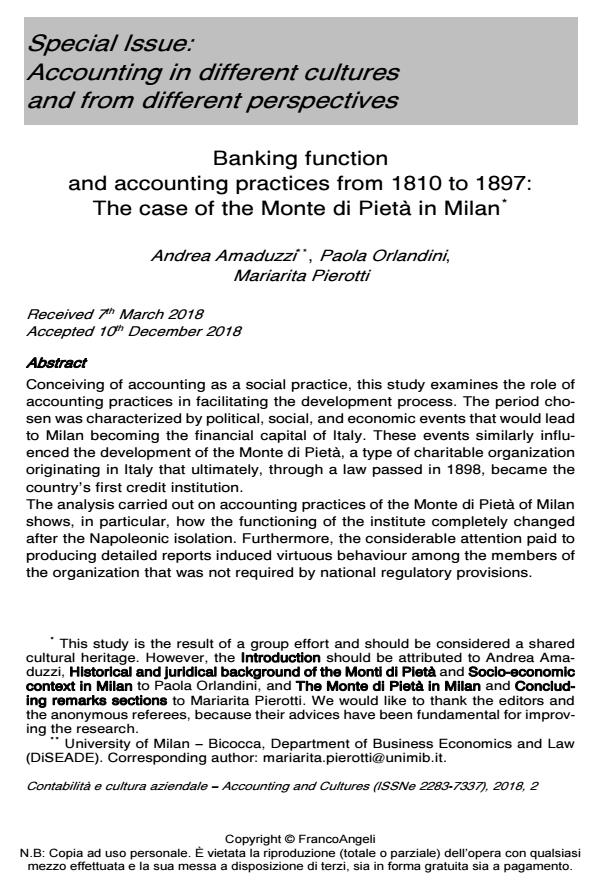Special Issue: Accounting in different cultures and from different perspectives. Banking function and accounting practices from 1810 to 1897: The case of the Monte di Pietà in Milan
Titolo Rivista CONTABILITÀ E CULTURA AZIENDALE
Autori/Curatori Andrea Amaduzzi, Paola Orlandini, Mariarita Pierotti
Anno di pubblicazione 2019 Fascicolo 2018/2
Lingua Inglese Numero pagine 39 P. 13-51 Dimensione file 308 KB
DOI 10.3280/CCA2018-002003
Il DOI è il codice a barre della proprietà intellettuale: per saperne di più
clicca qui
Qui sotto puoi vedere in anteprima la prima pagina di questo articolo.
Se questo articolo ti interessa, lo puoi acquistare (e scaricare in formato pdf) seguendo le facili indicazioni per acquistare il download credit. Acquista Download Credits per scaricare questo Articolo in formato PDF

FrancoAngeli è membro della Publishers International Linking Association, Inc (PILA), associazione indipendente e non profit per facilitare (attraverso i servizi tecnologici implementati da CrossRef.org) l’accesso degli studiosi ai contenuti digitali nelle pubblicazioni professionali e scientifiche.
Conceiving of accounting as a social practice, this study examines the role of accounting practices in facilitating the development process. The period chosen was characterized by political, social, and economic events that would lead to Milan becoming the financial capital of Italy. These events similarly influenced the development of the Monte di Pietà, a type of charitable organization originating in Italy that ultimately, through a law passed in 1898, became the country’s first credit institution. The analysis carried out on accounting practices of the Monte di Pietà of Milan shows, in particular, how the functioning of the institute completely changed after the Napoleonic isolation. Furthermore, the considerable attention paid to producing detailed reports induced virtuous behaviour among the members of the organization that was not required by national regulatory provisions. In this sense, accounting was not only an instrument shaped by the context in which it was inserted, but it was also an instrument that shaped company functioning. The Monte, a charitable institution at the time actually functioned as a credit institution, even before legislative intervention. The accounting practices used, well above the legislative obligations, induced virtuous behaviours among the members of the organization. In other words, the Monte’s change into a credit institution was not the result of a path originated by legislative provision but rather from the social behaviour of its members, even by the means of accounting practices.
Parole chiave:Banking function, credit institution, Monti di Pietà, accounting practices, Napoleonic period, social practice.
Andrea Amaduzzi, Paola Orlandini, Mariarita Pierotti, Special Issue: Accounting in different cultures and from different perspectives. Banking function and accounting practices from 1810 to 1897: The case of the Monte di Pietà in Milan in "CONTABILITÀ E CULTURA AZIENDALE" 2/2018, pp 13-51, DOI: 10.3280/CCA2018-002003